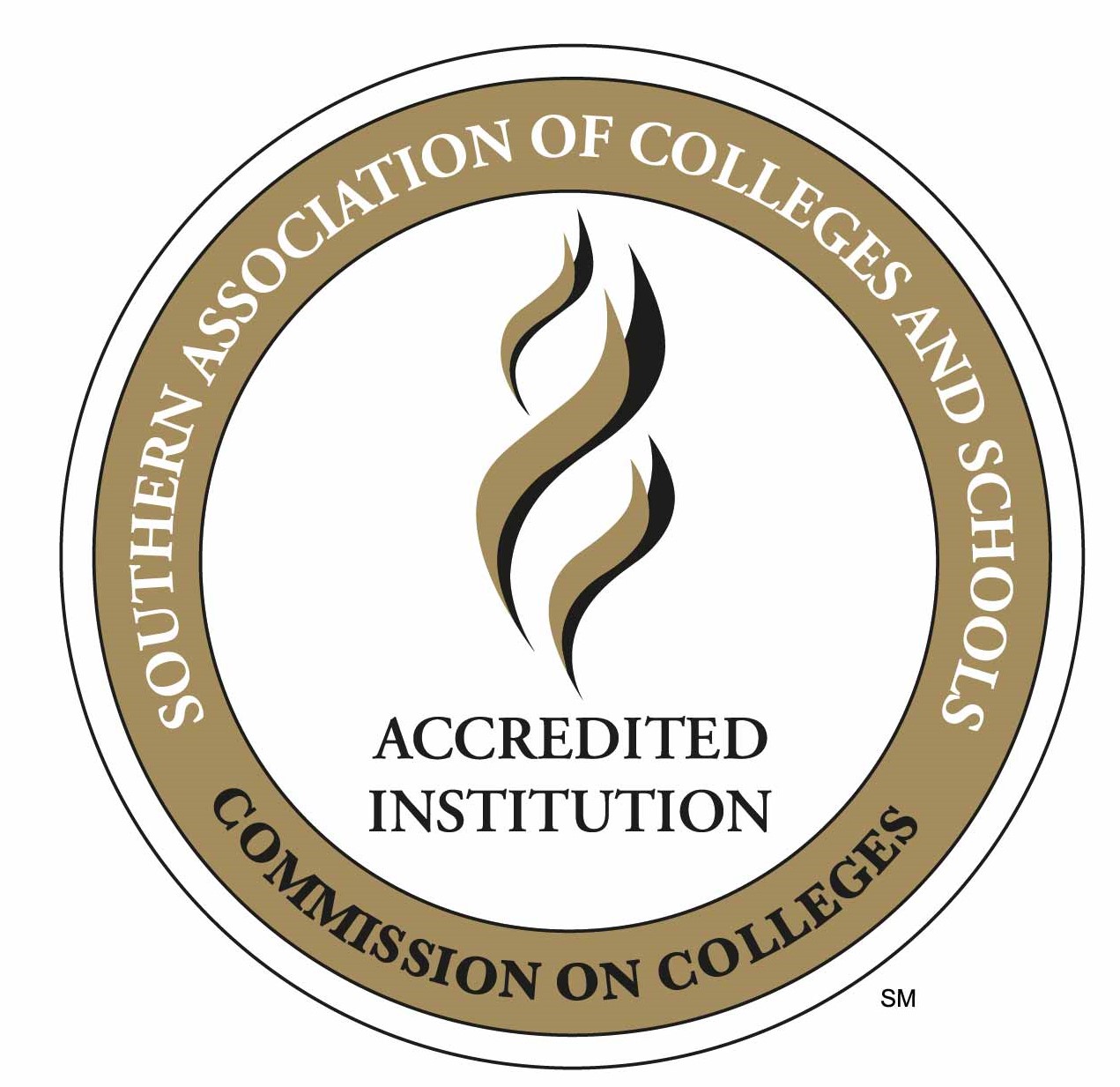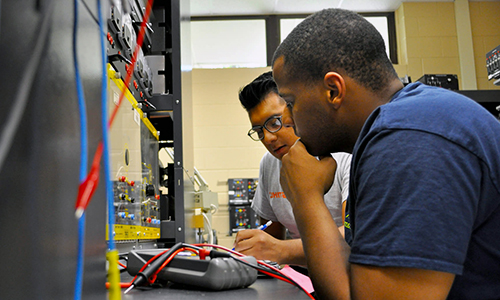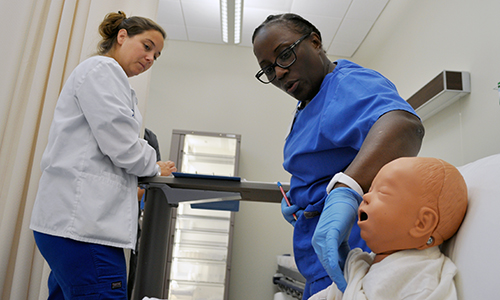What is SACSCOC?
Beaufort County Community College is accredited by the Southern Association of Colleges and Schools Commission on Colleges (SACSCOC) to award associate degrees. Beaufort County Community College also may offer credentials such as certificates and diplomas at approved degree levels. Questions about the accreditation of Beaufort County Community College may be directed in writing to the Southern Association of Colleges and Schools Commission on Colleges at 1866 Southern Lane, Decatur, GA 30033-4097, by calling (404) 679-4500, or by using information available on SACSCOC’s website (www.sacscoc.org).

The Commission on Colleges of the Southern Association of Colleges and Schools (SACSCOC) is the recognized regional accrediting body in the eleven U.S. Southern states (Alabama, Florida, Georgia, Kentucky, Louisiana, Mississippi, North Carolina, South Carolina, Tennessee, Texas and Virginia) and in Latin America for those institutions of higher education that award associate, baccalaureate, master's or doctoral degrees. The Commission on Colleges is the representative body of the College Delegate Assembly and is charged with carrying out the accreditation process.
- What is the "Reaffirmation Report?"
The Reaffirmation Report is the documentation prepared by the institution that provides evidence that the institution is in compliance with the SACSCOC Principles of Accreditation.
- What is the 5th Year Report?
The Southern Association of Colleges and Schools Commission on Colleges is one of only a few accrediting commissions that conducts a comprehensive review of its institutions every ten years. Most accrediting agencies conduct such reviews every 5 to 7 years. The U.S. Department of Education requires accrediting agencies that it recognizes to monitor its institutions more often to ensure that institutions having access to federal funds continue to meet accreditation standards. To that end, the Commission has developed a Fifth-Year Interim Report. This report addresses selected standards of the Principles of Accreditation, as well as the impact of the institution’s most recent Quality Enhancement Plan. The Fifth-Year Interim Report is due approximately four and one-half years prior to the institution’s next reaffirmation of accreditation, allowing the institution to demonstrate ongoing compliance with the selected standards following the mid-point of its reaffirmation cycle.
- What are the SACSCOC requirements?
The SACSCOC requirements are called the Principles of Accreditation: Foundations for Quality Enhancement. They are a list of principles and standards that we need to meet in order to be in full compliance with SACSCOC and receive our reaffirmation of accreditation.
- Who's involved in the process at BCCC?
Many people from all around the College will be actively involved in preparing the 5th year Interim Report and the Reaffirmation Report. The SACSCOC Leadership Committee will organize workgroups for each of the requirements and oversee the development of the report. If your area falls within one of the SACSCOC requirements being addressed, you may be asked to serve on one of these workgroups.
- What does BCCC have to do for SACSCOC?
BCCC must prepare a report that shows that the College is in compliance with all sections of the SACSCOC Principles of Accreditation.
- How does the submission process work?
Reports will be submitted electronically to be reviewed by an off-site SACSCOC team. An additional review team will visit the campus for the 10 year reaffirmation report to follow up on the off-site team report. The SACSCOC team will make a determination whether or not BCCC is in compliance with each requirement, and will report those findings to SACSCOC. For the 5th Year Interim report, institutions are required to host an on-site visit if it has established five (5) or more approved off-campus instructional sites, which have not hosted a visit since its last reaffirmation.
- Are the requirements the same for all colleges and universities?
Every college and university under the Southern Association of Colleges and Schools accreditation is required to meet the same principles and standards. While the requirements are the same, the ways the requirements are met are unique to the resources and creativity of each school.
Frequently Asked Questions about SACSCOC
What every employee needs to know and do for SACSCOC...
- That SACSCOC is not just something that happens every 10 (or 5) years.
- The impact of SACSCOC requirements on curriculum and operation of the College and the implications of not being accredited.
- The Scope of the approved quality enhancement plan (QEP), and specifics on the QEP programs and goals.
- Submit official academic transcripts (upon hire and when updated, etc.)
What every faculty member needs to know and do for SACSCOC...
- Submit accurate course syllabi for every course and section every semester, every year.
- Submit and maintain up-to-date CV (each year).
- Submit official academic transcripts (upon hire and when updated, etc.)
- Integrate curriculum revisions with student learning outcomes.
- How the quality enhancement plan (QEP) affects you, your teaching, your classes, etc.
What every Lead Instructor needs to know and do for SACSCOC...
- Facilitate and encourage regular discussions with faculty about student learning outcomes and the assessment of those outcomes.
- Coordinate, collect and enter yearly data on program learning outcomes.
- Complete Academic Program Review documentation in coordination with your Dean
- Relationship of program level accreditation to SACSCOC accreditation.
- Review all syllabi for accurate course description (matched to current catalog), and delivery of that scope within the course.
- Use the institutional process for curriculum revision and program changes (and include data for rationale for curriculum changes).
- Incorporate (and document) improvements based on institutional effectiveness data.
- How the quality enhancement plan (QEP) affects the department.
What every Dean needs to know and do for SACSCOC...
- Processes related to substantive change (when, how, who).
- Interpret and educate SACSCOC criteria for college.
- Advocate for and enforce policies and process that result in institutional improvement.
- Transmit all information related to reaffirmation in a timely manner.
- Monitor for programmatic effectiveness.
- How the quality enhancement plan (QEP) affects the college.
- Maintain an up-to-date faculty roster.
- Submit faculty justification(s).
- Need and process for substantive change.
- Ensure that all printed and web material matches the official documentation (mission, catalogs, program of study, etc.)
- Ensure faculty fulfill Academic Program Review and Program Learning Outcomes requirements.
What every non-academic unit director/coordinator, etc. needs to know and do for SACSCOC...
- Ensure that all printed and web material matches the official documentation (mission, catalogs, program of study, services, etc.)
- Facilitate or encourage regular discussions with all staff about departmental goals/outcomes and the assessment of those outcomes.
- Coordinate, collect and enter yearly data on departmental/unit outcomes.
- Incorporate (and document) departmental improvements based on institutional effectiveness data.
I still have questions. How do I ask questions about BCCC and SACSCOC?
For additional information you can contact the Office of Research Institutional Effectiveness:
Kimberly Mullis, Ed.D.
Dean of Institutional Effectiveness
SACSCOC Liaison
Beaufort County Community College
[email protected]
(252)940-6203
Office 1-006
You can also find information on the SACSCOC website and SACSCOC Frequently Asked Questions website.
Substantive Change
BCCC notifies the Commission of changes as stipulated in the policy and associated procedures and, if required, seeks approval prior to the initiation of such changes. BCCC is responsible for providing SACSCOC with a list of all substantive changes that occur between the College’s decennial reviews. By definition, a substantive change is “a significant modification or expansion of the nature and scope of an accredited institution” which includes “high-risk changes and changes that can impact the quality of educational programs and services.”
SACSCOC Substantive Change Policies and Procedures





